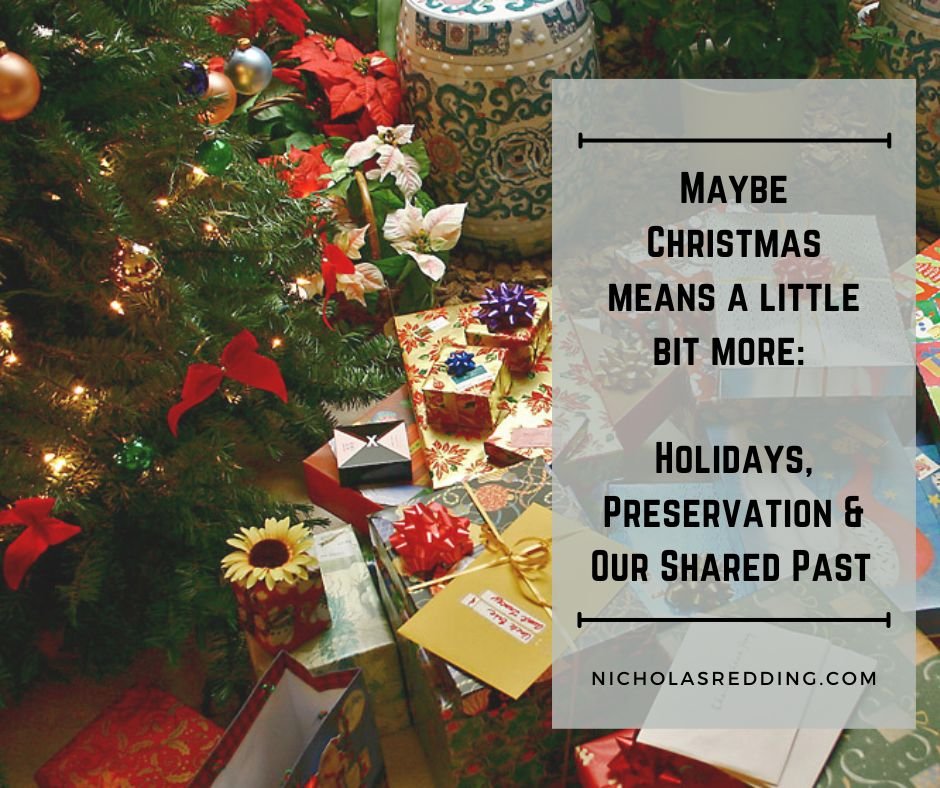Maybe Christmas means a little bit more: Holidays, Preservation & Our Shared Past
Background image: Kelvin Kay, en:user:kkmd, CC BY-SA 3.0 <http://creativecommons.org/licenses/by-sa/3.0/>, via Wikimedia Commons
The moment the Grinch comes to the realization that Christmas meant more than packages, boxes, or bags, is a moment of enlightenment that many of us have also reached.
Though we may not have had to bamboozle an entire town out of its Christmas splendor to get to that point, as we mature, we, too, have learned that, perhaps, holidays like Christmas mean a little bit more. Perhaps its why today, I personally enjoy Thanksgiving as much as Christmas — since it provides a moment to stop and appreciate what we have; to enjoy the company of friends and family, and often, to look back and reflect upon where we’ve been.
It occurs to me, as a preservationist, that holidays — be they Thanksgiving or Christmas — assume much of their power from a deep connection to the past.
The past speaks to us in many ways at the holidays
Our experience with the past can be personal. It can take the form of cherished memories of those loved and lost; reminiscing about long ago glittering trees or sumptuous recollections of plump turkeys.
Engaging with the past at this time of the year can also come as a meditation on our own place in a seemingly unbroken chain of history.
We can imagine generations untold and unknown, gathered and experiencing a moment of light, grace, and fellowship in the bleak midwinter. Many, if not most, holiday traditions hearken backwards to the past. We place ancient ornaments on a tree; light candles in memory of a moment a millennia ago; sing songs of yore; bake recipes passed down and even set fire to yules. We even tune our radios to the sounds of Bing Crosby. It’s a veritable living history display every year!
Indeed, Christmas means a little bit more and the past, both personal and collective, holds immense power in our celebration of holidays.
The chorus of cynics which routinely question the public’s interest in history seemingly overlook and forget the millions (billions?) who gather around a tree, a turkey, or a menorah, and every year look back to reflect on auld lang syne. Religion and faith, core to many holiday traditions and celebrations, can be viewed as part study of the past — a story passed down through the ages in holy scriptures, telling of deeds and acts of long ago. Love of that past provides believers with faith in the future, or, as the historian Stephen Ambrose once famously explained,
The past is a source of knowledge, and the future is a source of hope. Love of the past implies faith in the future.
The holidays, like an archaeological excavation, represent layers upon layers of history. The holidays are filled with history and permit us all a moment to slow down and enjoy a shared moment to celebrate that which still binds us — both to each other and to those who have come before.
For preservationists and the public history community — perhaps the holidays are also an important reminder to find ways to always make history personal and to engage where our audiences are already comfortable in reaching back to the past. History and preservation at the intersection of education and nostalgia is powerful — and perhaps would mean a little bit more.
For Auld Lang Syne,
-Nicholas Redding


